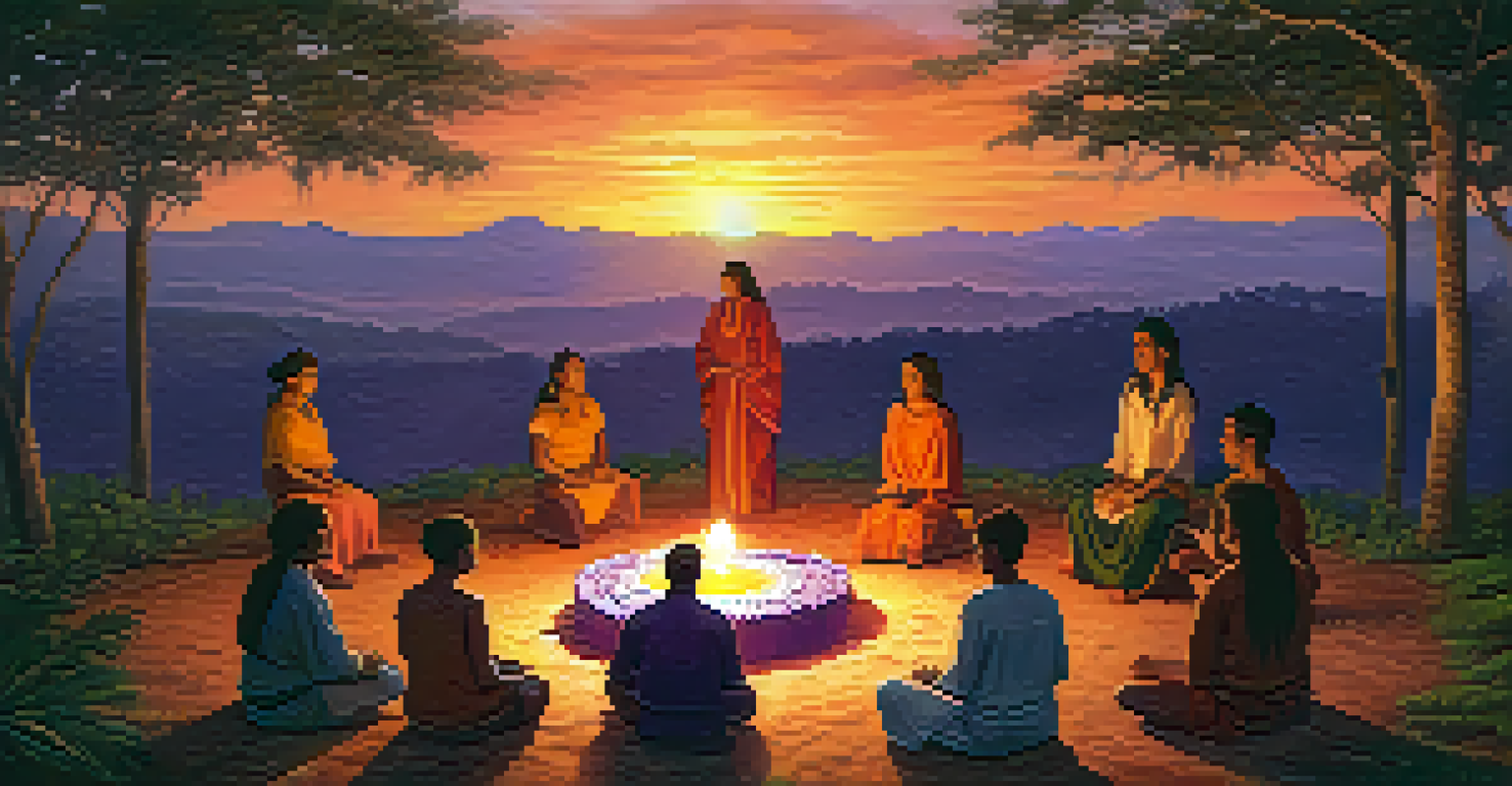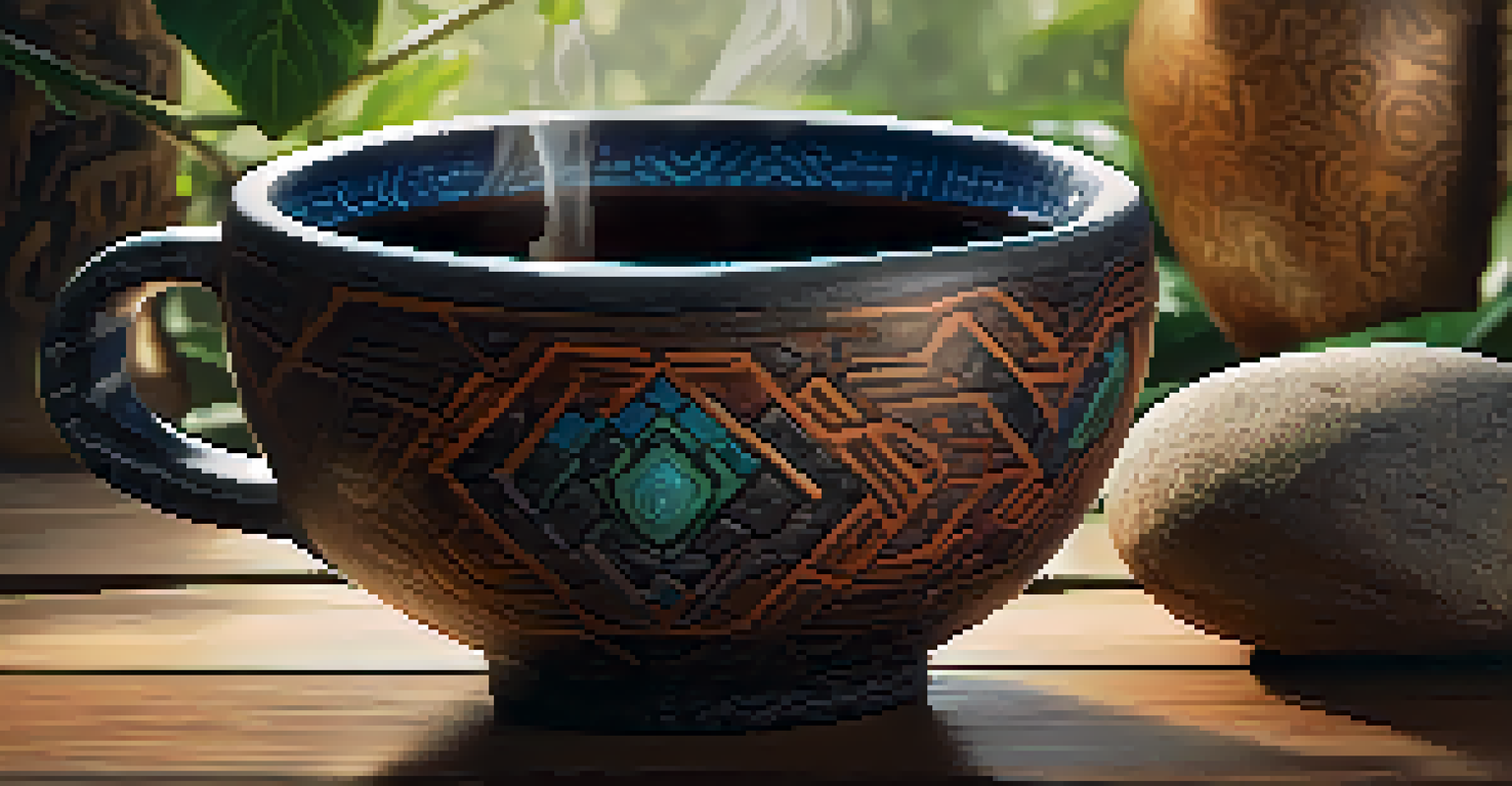Ayahuasca: Bridging Mind, Body, and Spirit in Healing

Understanding Ayahuasca and Its Origins
Ayahuasca is a powerful brew made from the Banisteriopsis caapi vine and the Psychotria viridis leaf, traditionally used by indigenous tribes in the Amazon. This sacred drink has a rich history, often serving as a tool for spiritual connection and healing. Over centuries, shamans have utilized Ayahuasca in ceremonies to facilitate personal transformation and communal bonding.
The experience of Ayahuasca is not just about healing the mind; it’s about healing the spirit and body as well.
The word 'Ayahuasca' translates to 'vine of the soul' in Quechua, reflecting its deep spiritual significance. It’s not just a drink; it’s a catalyst for introspection and emotional healing. As more people seek alternative healing methods, Ayahuasca has gained popularity outside its cultural roots, leading to both exploration and commercialization.
Understanding Ayahuasca's origins is crucial for appreciating its role in healing. It’s essential to approach it with respect for the cultural practices that surround it, ensuring that we honor the traditions of those who have used it for generations.
The Role of Ayahuasca in Mental Health
In recent years, Ayahuasca has emerged as a potential treatment for various mental health issues, including depression, anxiety, and PTSD. Many participants report profound emotional releases during ceremonies, often resulting in significant therapeutic breakthroughs. The brew’s unique combination of compounds can help individuals confront and process trauma, leading to transformative insights.

Research into Ayahuasca's effects on mental health is still in its early stages, but preliminary studies show promising results. For instance, participants often describe reduced symptoms of depression and anxiety after their experiences. This shift in mental state can be attributed to the brew’s ability to induce altered states of consciousness, allowing for a deeper understanding of oneself.
Ayahuasca's Healing Potential
Ayahuasca shows promise in treating mental health issues like depression and anxiety through deep emotional insights during ceremonies.
While Ayahuasca offers hope for many, it’s crucial to approach it with caution and under professional guidance. It’s not a panacea, and the setting in which one consumes it plays a significant role in the experience and overall mental health outcomes.
Physical Healing: Ayahuasca's Impact on the Body
Ayahuasca is often viewed as a holistic remedy that goes beyond mental health, impacting physical well-being as well. Many users report detoxification effects, experiencing purging through vomiting, which is seen as a cleansing process. This physical release can sometimes lead to a renewed sense of vitality and well-being.
Ayahuasca is a mirror that reflects the depths of your soul, guiding you on a journey of self-discovery and transformation.
Some studies suggest that Ayahuasca may influence the gut microbiome, promoting better digestion and overall health. This connection between gut health and mental health is becoming increasingly recognized in the medical community. People often leave ceremonies feeling lighter, both physically and emotionally, demonstrating the interconnectedness of body and mind.
However, it’s essential to approach Ayahuasca with an understanding of its potential physical risks. Consuming it can lead to side effects, and those with certain health conditions should consult healthcare professionals before participating in ceremonies.
Spiritual Awakening Through Ayahuasca
One of the most profound aspects of Ayahuasca is its potential to facilitate spiritual awakening. Many participants report experiencing deep connections to nature, the universe, and their own inner selves during ceremonies. These experiences often evoke feelings of unity and love, reshaping their perspectives on life and existence.
The experiences guided by shamans during the ceremonies can vary widely, from enlightening visions to confronting personal fears. Such encounters can lead to a greater sense of purpose and meaning in life. For many, these spiritual journeys provide clarity and understanding that can be life-changing.
Integration is Key After Ceremony
The process of integrating lessons from Ayahuasca experiences into daily life is crucial for sustained healing and personal growth.
Spiritual healing is a deeply personal journey, and Ayahuasca serves as a tool for exploration rather than a guaranteed solution. It’s essential for participants to approach these experiences with an open mind and a willingness to reflect on what they learn.
Navigating the Ayahuasca Experience
Participating in an Ayahuasca ceremony requires careful navigation and preparation. Setting intentions before the experience can help guide participants through the often intense emotional landscapes that arise. It’s common to hear stories of people who, with clear intentions, find the journey more meaningful and manageable.
Choosing the right setting and shaman is critical to ensuring a safe and supportive experience. Many people opt for retreats that prioritize ethical practices and cultural sensitivity. A knowledgeable guide can provide not only safety but also valuable insights to help participants process their experiences.
Ultimately, the Ayahuasca experience is a journey into the self that requires patience and openness. By preparing adequately and selecting the right environment, participants can glean the most from their transformative experiences.
Integration: Bringing Lessons into Daily Life
After an Ayahuasca ceremony, the real work begins with integration—applying the insights gained into everyday life. Many participants find this to be one of the most challenging aspects of the journey. It’s one thing to experience profound revelations during a ceremony, but translating those lessons into actionable changes can be daunting.
Integration can take many forms, including journaling, therapy, or community support. Engaging with others who have shared similar experiences can provide encouragement and accountability. It’s essential to remember that healing is a continuous process, and the insights gained from Ayahuasca can continue to unfold over time.
Cultural Respect in Practices
As Ayahuasca gains popularity, it's essential to approach its use with respect for its cultural origins and to avoid commercialization.
Support systems are vital during this phase to help individuals stay grounded and focused. By actively working to incorporate these lessons into daily routines, individuals can foster deeper connections with themselves and the world around them.
The Future of Ayahuasca in Healing Practices
As interest in alternative healing methods grows, the future of Ayahuasca in modern wellness practices looks promising yet complex. With more research being conducted, we may see increased acceptance and understanding of its therapeutic potential. However, this increased visibility also raises concerns about cultural appropriation and the commercialization of indigenous practices.
It’s crucial for practitioners and participants alike to approach Ayahuasca with respect and awareness of its cultural significance. Initiatives that foster collaboration between indigenous communities and modern wellness practitioners are essential to ensure ethical practices are upheld. These partnerships can help preserve the integrity of Ayahuasca ceremonies while also promoting its healing benefits.

Ultimately, the future of Ayahuasca hinges on a balanced approach that honors its roots while exploring its potential in contemporary healing. As we continue to learn and grow, the conversation surrounding Ayahuasca will evolve, paving the way for deeper understanding and responsible practices.